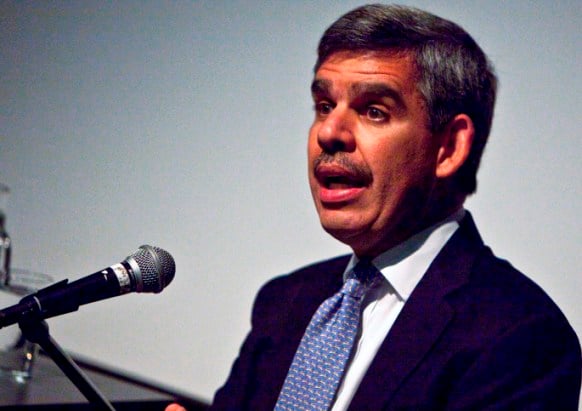El-Erian responding to what he terms U.S. government's 'financial repression'
Pacific Investment Management Co., which runs the world's largest bond fund, said “deteriorating debt dynamics” will stoke faster inflation and financial repression in the U.S. as well as at least one sovereign-debt restructuring in Europe.
In a report aimed at establishing a worldview for investors in the next three to five years, Pimco Chief Executive Officer Mohamed El-Erian raised the prospect of U.S. policy makers trying to force savers to accept returns below the rate of inflation as the government grapples with a budget deficit the White House reckons will reach $1.6 trillion this year.
“It is a world where several governments in advanced economies, and the U.S. in particular, opt for financial repression and mild inflation as the major way to accommodate their deteriorating debt dynamics,” Newport Beach, California- based El-Erian wrote in a report published today on the firm's website. “It is a world that heals slowly and unevenly and remains structurally impaired.”
Such tactics are evidence officials will continue to “hobble” through in their efforts to propel economies from the aftershocks of the global recession, he said. Europe will remain plagued by its fiscal crisis with “the virtual certainty of at least one, and probably more, sovereign-debt restructurings.”
El-Erian, whose firm promulgated the term “new normal” to describe an economy characterized by slow growth in developed countries and rapid expansion in emerging markets, made clear that Pimco is sticking with that outlook.
Inflation Convergence
Advanced economies will face growth of about 2 percent and persistently high unemployment, while emerging markets will enjoy expansion of about 6 percent, with their income levels converging to those of rich nations, he said. Inflation will settle at “levels that are higher than currently anticipated” as headline rates mesh with so-called core rates which exclude energy and food prices, he said.
“The next three-five years will be characterized by the same multi-speed dynamics we have seen recently,” El-Erian said. To cope with the growing uncertainties, Pimco will pursue an approach of “constructive paranoia” in managing its more than $1.3 trillion in assets.
It expects bond-yield curves will be steeper than traditionally and said foreign-exchange investors should favor the undervalued currencies of emerging markets where balance sheets are strong and capital controls tend to be ineffective. El-Erian added that commodities in short supply or that provide a store of value should also do well.
Financial Repression>
Under a strategy of financial repression, governments often require banks, pension funds and other financial institutions to hold government debt, ostensibly for reasons related to the safety and soundness of the organizations concerned.
Economists Carmen Reinhart and Belen Sbrancia wrote in a March study that financial repression helps keep interest rates low and can help pare debts, identifying the years 1945 to 1980 as an era of financial repression with real interest rates in advanced nations in negative territory for about half the time.
Such a situation may occur now because almost four years since the start of the financial crisis, “the world has seen little meaningful reduction in the size of the excess liabilities accumulated” beforehand, El-Erian said. “Rather than be addressed in a convincing manner, most of the excess liabilities have simply been shifted around the system, and importantly to public balance sheets and taxpayers.”
‘Grand Bargains'
El-Erian nevertheless sees “some encouraging signs that speak to an accelerated healing of the global economy.” He also said a stronger expansion could materialize if policy makers begin striking “grand bargains” to tackle challenges such as Europe's indebtedness and structural needs of the U.S. economy.
“While the probabilities for these grand bargains have increased in recent months, they are still far from dominant,” he said.
Pimco's outlook was crafted at a three-day forum held last week at its headquarters and repeats a tradition dating back almost four decades. The aim of the meeting is to establish the “guard rails” to observe when investing in coming years.
--Bloomberg News--







